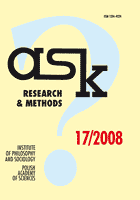Decomposition of Long-Term Changes in Political Opinions According to Group-Specific Markov Processes
Decomposition of Long-Term Changes in Political Opinions According to Group-Specific Markov Processes
Author(s): Irina Tomescu-DubrowSubject(s): Social Sciences
Published by: Instytut Filozofii i Socjologii Polskiej Akademii Nauk
Keywords: long-term; short-term change in public opinion; group-specific Marcov processes; stochastic matrices; evaluation of socialist; POLPAN; POLTEST
Summary/Abstract: In this paper I use longitudinal data for Poland to test the assumption that political opinion change through time is not entirely due to some universal and time-constant processes; rather, it depends on the initial conditions in a person’s state. Information on Poles’ evaluations of the past socialist regime available for repeated intervals, and over a sufficiently long time period—ten years—allows me to decompose long-term changes in assessment of socialism into short-term change, and the reliability of responses according to group-specific Markov processes. I obtain three types of stochastic matrices: Mt, t+10, Mt, t+1, Mrel = R , where M refers to a matrix of opinions in time t by opinions in subsequent time, t refers to specific years, and R is the reliability matrix from the measurement of opinions in one-month period. To assess the fit of the observed transition matrix for the 10-year period as a linear combination of matrices Mt, t+1 and Mrel, I apply the random effect maximum likelihood function in STATA, with the bootstrap option for obtaining the standard errors of the coefficients. Results demonstrate that Markov-type processes do not have significant explanatory power for long-term change in opinions about socialism. Substantively, this means that the ‘subjective’ legacy of the past, namely peoples’ views of the former regime, matters.
Journal: ASK. Research & Methods
- Issue Year: 2008
- Issue No: 17
- Page Range: 101-113
- Page Count: 13
- Language: English

